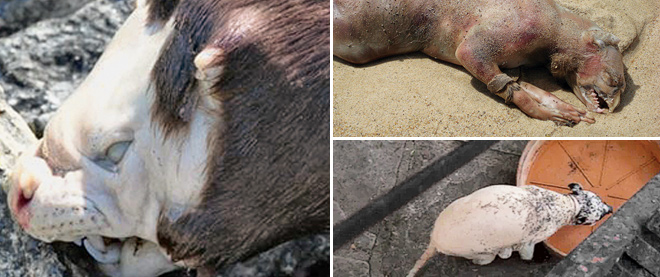
June 9, 2010

One of the most prominent magazines in Canada, Macleans, has decided to do an overview of the washed ashore and related hairless wonders so loved by the press. Entitled, Monster season is upon us: Unusual creatures keep appearing. Are they new species or mere baldies?, the article was written by Kate Lunau for Tuesday, June 8, 2010.
Here is part of the story:
The Montauk Monster was given its name by Loren Coleman, who lives in Portland, Maine. He’s devoted the past 40 years to cryptozoology, the study of hidden or unknown animals like the Yeti. (A bit of trivia: the term “Sasquatch,” he notes, was coined in a Maclean’s article about Bigfoot in 1929.) Judging from the Montauk Monster’s feet, skull and other features, “it’s definitely a raccoon” gone bald from floating in the water, he says. The uptick in mystery creatures that followed was probably due to all the coverage the Montauk Monster got, having washed up in the media hub of NYC, but the others weren’t real monsters either—the Panamanian creature turned out to be a sloth, and the one in Alaska was most likely a beached seal. “These animals are really mundane,” he says.
Still, even the most mundane creature can look rather alarming when it loses its fur. Last summer, a bald creature—this one still alive—terrorized west end Toronto, feasting on residents’ garbage and becoming a minor YouTube sensation. Like the Montauk Monster, it turned out to be a raccoon, one that looked admittedly scary: “Underneath all that fluff, raccoons don’t look so great,” says York University professor Suzanne MacDonald, who identified the creature. And earlier this year, a wrinkly naked beast named the “Oriental Yeti” was discovered in China, sparking media coverage around the world. “Hairless animals seem to generate a lot of interest in the public mind,” MacDonald says. The most recent mystery monster remains unidentified, although Coleman thinks its glossy fur suggests it’s a mink, while MacDonald thinks it could be a wolverine. Without the body, “we’ll probably never know what it was,” [Big Trout Lake Chief Donny] Morris says. One thing’s for sure, he adds: it’s not a bald raccoon, since there aren’t any that far north.
About Loren Coleman
Loren Coleman is one of the world’s leading cryptozoologists, some say “the” leading living cryptozoologist. Certainly, he is acknowledged as the current living American researcher and writer who has most popularized cryptozoology in the late 20th and early 21st centuries.
Starting his fieldwork and investigations in 1960, after traveling and trekking extensively in pursuit of cryptozoological mysteries, Coleman began writing to share his experiences in 1969. An honorary member of Ivan T. Sanderson’s Society for the Investigation of the Unexplained in the 1970s, Coleman has been bestowed with similar honorary memberships of the North Idaho College Cryptozoology Club in 1983, and in subsequent years, that of the British Columbia Scientific Cryptozoology Club, CryptoSafari International, and other international organizations. He was also a Life Member and Benefactor of the International Society of Cryptozoology (now-defunct).
Loren Coleman’s daily blog, as a member of the Cryptomundo Team, served as an ongoing avenue of communication for the ever-growing body of cryptozoo news from 2005 through 2013. He returned as an infrequent contributor beginning Halloween week of 2015.
Coleman is the founder in 2003, and current director of the International Cryptozoology Museum in Portland, Maine.
Filed under Breaking News, Cryptotourism, CryptoZoo News, Forensic Science, Media Appearances, Proto-Pygmies, Weird Animal News